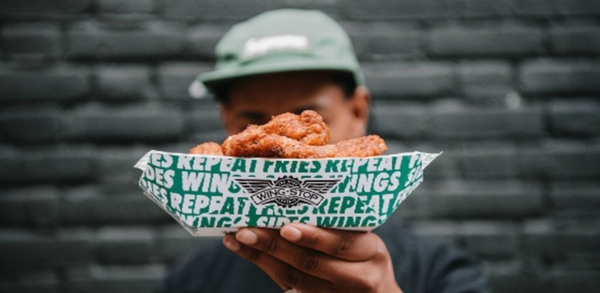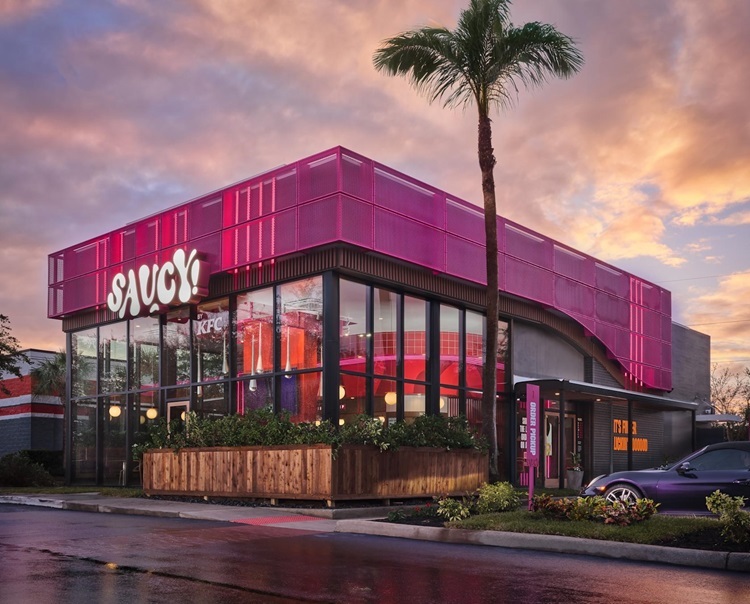Technology Prospectus 2018 – Mobile ordering – How to build loyalty
It's not just mobile's payment functionality that is driving its popularity with customers and operators, but also its ability to build loyalty. Elly Earls reports
Although mobile still accounts for only a fraction of contactless payments in the F&B sector, even in London, there's no doubt the tide is starting to turn. Starbucks' app set the scene three years ago, alongside the likes of Just Eat and Deliveroo in the delivery space. Apple Pay and Samsung Pay have subsequently added to the customer expectation that mobiles can be used to pay the bill, albeit only for small amounts.
Sales at pub chain Wetherspoon have also soared, thanks to the growing use of its free and easy-to-use pre-order and payment app, and 1.8 million transactions now go through multi-retailer mobile wallet Yoyo Wallet every month across universities, corporates, cafés and restaurants nationwide.
Take-up may still be low, but the buzz around these solutions has made consumers realise that paying by mobile is the inevitable future. Yet for Yoyo co-founder Alain Falys, it's not payment functionality that's driving uptake, but the potential for the smartphone to act as a personal communication device between retailer and customer. "Yoyo has demonstrated that people use their mobile to pay every day because they see an advantage in doing so, which is to do with the power of personalised marketing around mobile payment and what it does to influence behaviour," he says.
Yoyo Wallet is not just a payment app, it also lets customers collect loyalty rewards and a digital receipt all via one scan of the smartphone. At the same time, on the back-end platform, retailers receive data from every customer transaction, which can be processed to provide customers with a more personalised and relevant experience.
At Caffè Nero, which launched a Yoyo-powered app in April 2017, the results speak for themselves. âIn November, we passed 6% share of checkouts and that will grow to about 10% by Christmas. They are now creating very interesting campaigns to promote certain products,â Falys explains.
For example, an app-based campaign increased customer purchases of iced lattes by 215% last summer, with 65% of sales coming from the app. And a Christmas cracker promotion, where customers shake their phone to reveal a high-value prize or, more likely, a silly joke, attracted the best part of 3,000 new users a day.
Predictions for 2018
Over the next 12 months, Falys expects more businesses to embrace the digital world. âMore ubiquity creates more usage, and more users create the impetus for more retailers to accept Yoyo,â he says, adding that he believes caterers and F&B operators are going to start rethinking loyalty in the context of the smartphone and data, with a noticeable move away from plastic and paper loyalty cards.
âAs more case studies are put forward, demonstrating the power of the clever use of data to influence behaviour and create a more personalised experience, more retailers will want to jump on the bandwagon,â he explains.
âI think chief executives of quick-service chains and F&B businesses in general will be in a bad place if they havenât started implementing a sound mobile-first solution.â
James Sykes-Hagen, group business development director at QR scanning app Zapper, agrees. âLoyalty is 100% the future of the industry and what weâve looked at is what is the most seamless way we can do that,â he says. âZapper has an in-app loyalty card that automatically updates every time a customer pays, so they donât have to stumble around for their paper loyalty card. It saves a lot of money for retailers, as well as providing strategic information about their customers and what theyâre buying.â
Beyond loyalty, pre-ordering is another trend thatâs likely to gain ground in 2018, according to Tom Weaver, chief executive of mobile payment app business Flypay. âFrictionless payments are becoming an expectation,â he says. âMobile ordering works amazingly well in sites with counter service, such as Wetherspoon or GBK. Weâre yet to see significant adoption from table service restaurants that worry about reducing the role of the waiter â" they prioritise pay-at-table experiences. But thatâs likely to change as the first major brands have embraced it and will make it successful.â
Graham Cornhill, managing director of Wi-Q, which provides a cloud-based ordering and payment solution so customers donât have to download and install an app, agrees that convenience will become even more important. âWe have recently partnered with Tola MobilePay, allowing consumers to charge the cost of their coffee or meal to their mobile phone bill, be it Vodafone, O2 or EE,â he says.
âThis removes one of the few remaining inconveniences in the mobile transaction â" entering your payment details the first time. The whole ordering process takes just seconds, even for the very first purchase. Wi-Q does not force customers to sign up, register, login or even put in their payment details.â
The future is aggregated A little further ahead, the future of mobile payment and loyalty is unlikely to centre on standalone apps, although it will be a slow evolution towards aggregation, according to Falys, similar to the development of e-commerce over the past 15 years from proprietary sites to the coexistence of marketplaces with those sites and then a shift in volume towards the likes of Amazon and eBay. âPeople donât cease to love the brand, but they like the convenience of a one-stop shop, and the same thing is happening now on the high street,â he says.
Take Caffè Nero. Its Yoyo-powered app is already incredibly popular, with 150,000 users at the time of writing. But Caffè Nero is also present on the Yoyo Marketplace, so users who, say, work at JP Morgan or study at Imperial College can use Yoyo at work and on campus, and in a Caffè Nero outlet. Caffè Neroâs presence on the marketplace still includes the brandâs logo, image and rewards system. âThatâs the most important thing,â Falys says. âThe brand wants to keep that very strong identity â" the marketplace is only a facilitator.â
In the US, things have already gone further, with Facebook announcing a big drive towards mobile ordering, partnering with GrubHub, Delivery.com, DoorDash, ChowNow, Zuppler, EatStreet, Slice and Olo to link to those food-ordering businesses and restaurants that support them. âThis is important, as many operators have typically waited for the winner in a space like ordering or payment before jumping on board,â Weaver says. âNow it is more important to be on a platform to ensure you can connect to where the consumer is.â
Bots and skills
Other areas where significant progress has been made in 2017 â" and will continue to accelerate in 2018 â" are bots and skills. Bots on Facebook Messenger, for example, can be linked to existing Facebook pages, taking advantage of traffic, visitors and likes on those pages and providing functionality previously limited to apps. PizzaExpress has led the way with its booking bot, and Flypay has a Pay at Table bot as well as an ordering bot in the pipeline.
OpenTable has just realised an Amazon Echo Show skill to let people make a table booking voice-first, and Wi-Q is building skills to integrate its software into Amazon cloud, negating the need for voice bots in public places. The idea is that guests simply use their own device to speak their orders.
âWe expect to see conversational commerce dominate all walks of life over the next five years,â Cornhill says. âThe ability to speak your order is not only a possibility but, thanks to Amazon, largely a reality. Although there are still challenges, such as ambient noise reduction, itâs very close to commercial reality.â
In the meantime, the next year will be one of adoption and roll-out of the basic available technologies â" from pre-order and pay-at-table to digital loyalty solutions such as Zapperâs and Yoyoâs. âMerchants are moving away from a wait-and-see mindset, and also away from a feeling they have to build their own apps to play in the digital game,â Weaver says.
Really, though, it all comes down to one simple idea, Falys believes. âThe challenge for retailers is to keep your customers coming back, not losing them,â he says. âRetention is key to your leadership and your number-one priority, as itâs a very fickle world out there. Step one is to know your customers, and step two is to engage with them in a way that feels personal to them. Thatâs what the transformation around mobile phone and the digital world is making possible.â
Scrummy â" the loyalty app club small operators can join
An appealing option for smaller businesses looking to boost their customer loyalty is Scrummy Club. Designed solely for small, independent traders, the app, which combines mobile loyalty and rewards, word-of-mouth and email marketing, offers an easy but significant step up from the familiar paper loyalty schemes.
âScrummy doesnât require any till integration and, because it doesnât require any additional hardware such as tablets, it frees up valuable counter space for product displays and service,â says co-founder James Vanderzee.
He adds that while cash and card payments are still the norm for most customers, mobile payments and order-ahead are certainly on Scrummy Clubâs roadmap.
In the meantime, customers are enjoying getting loyalty rewards from all their favourite small and independent traders in one place, while businesses are finding that a collaborative approach to a loyalty scheme can be a healthy thing.
âBy working with other local businesses â" even some of their competitors â" our traders are helping to level the playing field between themselves and their larger competitors on the high street,â Vanderzee says. âThere are even co-promotions, so people getting their hair cut at one Scrummy trader, for instance, get a deal on coffee from another Scrummy trader next door.â
Influencing customer behaviour and boosting business
Through Yoyo Walletâs campaign manager platform Yoyo Engage, F&B operators can offer customers a genuinely personalised experience, helping build loyalty while encouraging them to make decisions that most benefit the business.
For example, to increase footfall during the hot summer of 2017, Caffè Nero pushed its iced-drinks range by offering double stamps for every purchase via its app. One week after the campaign launched, the number of customers who purchased an iced drink rose 215%, spend on baskets containing an iced drink went up 212% and average transaction value went up 26%.
Vietnamese fast-food chain Hop took a similar approach to increase the frequency of purchases on Tuesdays, a day that usually dips. Through the Yoyo app, it offered double loyalty points to all customers who came in on that day. The month after the campaign, the number of unique customers rose by 85%, transactions by 51% and revenue by 61%.
âRetailers are smart enough to push or not push certain payment methods,â says Falys. âItâs very rare that you go into a retail store and they are doing everything they can to promote a particular payment method such as Visa â" they just donât do that. But they do with Yoyo precisely because they know the benefit of influencing customer behaviour by leveraging data.â
Sponsorâs comment
Founded in 2013, Yoyo is the fastest-growing mobile payment and loyalty marketing platform in Europe. Through its unique omni-channel point-of-sale
acceptance rails, Yoyo delivers a seamless mobile payment and loyalty experience for consumers while providing retailers with the tools to better engage, reward and retain their customers.
Yoyo is partnered with several high street retail chains, including Planet Organic, Harris + Hoole, HOP Vietnamese and Wrap it Up. Yoyo also built the branded payment and loyalty app for Caffè Nero.
Yoyo is present in more than 70 universities across the UK and Ireland, as well as canteens in 200 corporate locations.
Overall, Yoyo processes more than 1.75 million transactions a month, with more than 700,000 registered users and 370,000 monthly active users.















